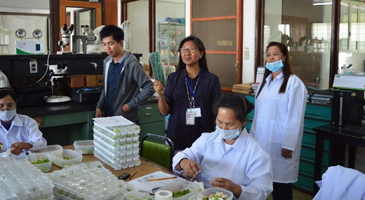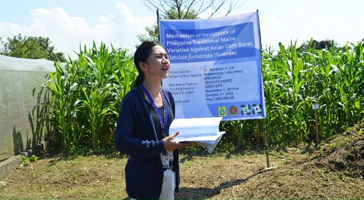 A project funded by the Philippine Council for Agriculture, Aquatic and Natural Resources Research and Development of the Department of Science and Technology (DOST-PCAARRD) will aim to understand traditional maize or corn and its origin of resistance against the Asian corn borer (ACB) through antibiotics, antixenosis, and tolerance.
A project funded by the Philippine Council for Agriculture, Aquatic and Natural Resources Research and Development of the Department of Science and Technology (DOST-PCAARRD) will aim to understand traditional maize or corn and its origin of resistance against the Asian corn borer (ACB) through antibiotics, antixenosis, and tolerance.
Titled, “Mechanism of Resistance of Philippine Traditional Maize Varieties against Asian Corn Borer, Ostrinia furnacalis (Guenee),” the project will be implemented by the Institute of Plant Breeding, University of the Philippines Los Baños (IPB-UPLB).
An inception meeting was recently held to iron out the details of the three-year project with DOST-PCAARRD. Dr. Merdelyn C. Lit, project leader from IPB-UPLB, emphasized the importance of studying and developing resistant traditional corn varieties. “Traditional corn varieties have the potential to generate higher income for farmers. They can also be processed into an alternative food-source known as corn grits. This adds more value since traditional varieties have lower glycemic index,” she said.
 During the meeting, Ms. Angelyn Marta D. Marmeto, project staff, updated the group on the completion of ACB leaf-feeding assay strains and the initial preparations for the confirmatory screening of ACB resistance.
During the meeting, Ms. Angelyn Marta D. Marmeto, project staff, updated the group on the completion of ACB leaf-feeding assay strains and the initial preparations for the confirmatory screening of ACB resistance.
The expected outcome of the project is a determined mechanism of resistance of traditional corn varieties. Potential outputs of the project include publishable journal articles, ACB-resistant traditional maize, trainings for students (insect rearing, resistance screening, and mechanism studies), assisted graduates, and a policy recommendation on the use of traditional maize for food consumption among small-scale farmers.
 Organized by DOST-PCAARRD’s Crops Research Division (CRD) Monitoring and Evaluation Team led by Dr. Edna A. Anit, the inception meeting concluded with a site visit to IPB’s field demonstration area and entomology laboratory where the experimentation takes place.
Organized by DOST-PCAARRD’s Crops Research Division (CRD) Monitoring and Evaluation Team led by Dr. Edna A. Anit, the inception meeting concluded with a site visit to IPB’s field demonstration area and entomology laboratory where the experimentation takes place.
